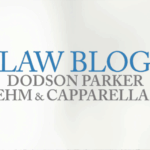Harmless Error Doctrine Extends to Rule 12.02(6) Motion
The Tennessee Court of Appeals recently released an opinion that provides a compelling insight into the sticky wicket of civil procedure. The facts of the case involve an otherwise pedestrian dispute between homeowners and their contracted buyer on one hand and an HOA on the other. The ruling, however, ultimately touches on the joinder doctrine and the relation back rule, the harmless error doctrine, the admissibility of evidence at the summary judgment stage, pleading rules, and consideration for contracts to forbear bringing suit.
Civil litigation practitioners should read the entire opinion, paying particular attention to the Court of Appeals’ description of how Tenn. R. Civ. P. 15.03 applies to obviate a statute of limitations defense. Additionally, readers should note the pronouncement by the court that the harmless error doctrine extends to Tenn. R. Civ. P. 12.02(6) motions to dismiss. This is evidently an issue of first impression in Tennessee law. The Court of Appeals decreed this new rule as follows:
Nevertheless, we agree that premature dismissal under Rule 12.02(6) is harmless error if, at the time of the trial court’s ruling, (1) there was a pending motion for summary judgment, (2) the non-moving party had a full and fair opportunity to respond, and (3) summary judgment is appropriate as a matter of law.
The upshot of this ruling is essentially that, if a trial court errs in granting a Rule 12 motion to dismiss, but a grant of a pending summary judgment motion would have been appropriate, then the dismissal will be upheld under Tennessee’s long-standing “right result/wrong reason” rule.
Given the many issues of civil procedure addressed in this opinion, it will be interesting to see if the parties choose to ask the Tennessee Supreme Court to grant permission to appeal.
Later-Filed Claims May Be Barred When “Relation Back Rule” Doesn’t Apply
In the recent case of Bracy v. McDonald, the Tennessee Court of Appeals provide a refresher of how the “relation back rule” works under Tn. R. Civ. P. 15.03.
Plaintiff Martin W. Bracey, Jr. was involved in a very serious car collision with a tractor trailer that occurred on August 31, 2012. Bracey suffered horrible injuries, including the loss of one arm, and subsequently filed a lawsuit on July 10, 2013 naming the driver of the tractor trailer, Otis McDonald, and Conard Transportation, Inc. The complaint alleged negligence on behalf of the driver and asserted that Conard was liable under a theory of respondeat superior.
On March 25, 2014, Plaintiff amended his complaint (First Amended Complaint) to add additional defendants, described in the court’s opinion as Employee Solutions, LLC and the Ingram Defendants. In the amended complaint, Plaintiff alleged that McDonald was driving the tractor trailer pursuant to an agreement among the named defendants and that, accordingly, McDonald was an agent or employee of each of the defendants.
Employee Solutions and the Ingram Defendants both moved to dismiss the First Amended Complaint on the grounds that the lawsuits against them were time-barred. Shortly after the filing of these motions, Plaintiff moved to amend in order to assert that Plaintiff could not have reasonably discovered the identity of the Employee Solutions and the Ingram Defendants as necessary parties until discovery was underway. Plaintiff further asserted that their involvement was fraudulently concealed.
Because the lawsuit against Employee Solutions and the Ingram Defendants was filed more than a year after the injury occurred, the lawsuit was barred by the statute of limitations unless the First Amended Complaint related back to the original complaint pursuant to Rule 15.03 of the Tennessee Rules of Civil Procedure. read more


